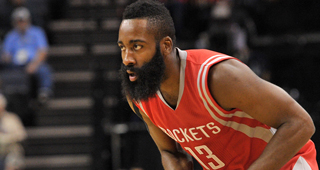For all the reported locker room dislike between James Harden and Dwight Howard, the two have recently had one thing very much in common: both have been reliable sponges for public vitriol, soaking up the very worst of the NBA’s internet-comment fandom. This, in fact, has become something like a defining feature for the Houston Rockets franchise: being disliked. Daryl Morey knows all about this feeling, too, having positioned himself at the head of the analytics snake slithering rapidly throughout the league, alienating fans who like bluster more than they like economics and math.
A year ago, numbers-hating Rockets schadenfreude ran rich as the team crawled into camp in a state of collective resentment that had much of the team overweight, and that got Kevin McHale fired within a month of the season starting. Everything was pretty bad, and it got worse throughout a season in which Harden grew to throw lobs to Howard that looked intentionally sent to impossible spaces, places the big man couldn’t get into and would only embarrass himself trying to jump for.
The pressure cooker of championship hopes in the Western Conference undid this team quickly, as it has many teams before. Within three games of the Finals in 2015, the Rockets barely slunk into the postseason in 2016, and were swiftly dismissed by the Golden State Warriors when they got there. Systematic changes had to be made, and were. Howard has found more aspirational pastures, now gone to the Atlanta Hawks to lean into the Odyssean energy set forth by LeBron James’ journey home, seeking redemption in his old city. Harden has stayed put, with Morey rebuilding the Rockets to be more an extension of his creative scoring will.
Both players are in stereotypically improved shape as they look down the barrel of their dual absolution narratives. Harden is cutting up preseason defenses with extra craft and fury now that Mike D’Antoni is in his ear dispensing Seven Seconds Or Less wisdoms; Howard is backing dudes down and dunking on them with a vintage meanness that his chiropractors probably do not recommend.
How Howard will fare back in Georgia is a more nebulous wonder than what we’re seeing from a renewed Harden, who projects to be back in the running through another MVP race as he revives the relentless streak of wizardry, ingenious game hacks, and sheer force of touch that made him among the most unguardable modern players two seasons ago. With Harden slotted in as the Rockets’ official point guard in D’Antoni’s offense and with Clint Capela and Nene—Howard’s replacements, more or less—cutting to the hoop at his service and seemingly doing everything with his beard’s singular skills and vision in mind, it seems possible that he could coast to historically outlying productivity. Harden will be in a position to easily score or assist on essentially every possession he’s in the game, for a team that threatens to increase the number of possessions per game to previously unseen numbers.
It’s predictable that Harden will be excellent on the court, but whether he can win his battle with the bluster about him is a more outsized consideration. He has entered the vortex of public figures involved with the Kardashian family, a collection of humanity that since their patriarch defended O.J. Simpson in court in the 90s has lived in a dissonant channel of Faustian barters and overgrown vanity and a never-ending, highly monetized performance of the self. Adjustment to life at this teetering top is a process most cannot undertake. It has destroyed many individuals; while Howard’s story is still technically being written, many have confidently concluded that he did not survive the passageway into über-fame, and has already been broken by the strange behavioral demands that assail the people on our TVs like hurricanes. The tidal wave of hate and higher expectations has been washing over the static of Howard’s career for years now.
In 16-17, it is Harden’s primary challenge to get back to sea swimmingly, stemming his swoon so that it lasts for just one season, returning himself to a shelf of the public imagination where he might still be adored by some. Once the “quirky guy” member of the Oklahoma City Thunder’s young shining core—a sort of overmythologized diaspora now, with all four players on different teams and experiencing something like what the Fab Five knew of NBA life two decades ago—Harden had women and children clamoring for him at NBA Finals games, with fake beards strapped to their chins in admiration. Now he is a regular dunce among followers, the subject of many shaming sessions and defensive exposes throughout the ball-loving web.
These things matter to Harden, because if anyone did anything and had millions of people talking badly about them for it in public forums, that would matter to them. Watching him turn a potentially revolutionary offense into a proving ground against all his bad boo birds, the kind that have had his now ex-teammate Howard pinned down for years, will be one of the surefire delights of our new NBA season. As the main character of a rehabilitating Rockets squad, he has the opportunity to record another unforgettable season.



